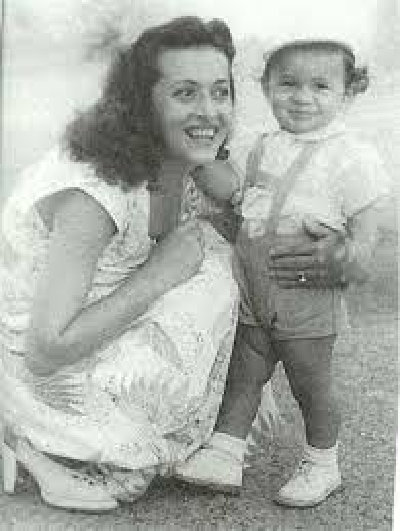
Before being KISS’s frontman, Gene Simmons was Chaim Weitz—the son of Holocaust survivor Flóra Klein. This is the story of her courage, sacrifice, and their journey from Auschwitz to arena rock.
Some stories are so improbable, they almost defy belief. A teenage girl in Hungary loses her entire family in Auschwitz, endures slave labor, and somehow survives. She builds a new life out of the ashes, immigrates with her only child to America, and raises him as a single mother in Queens. That boy, once a lonely immigrant struggling with English, would one day breathe fire, spit blood, and command stadiums of screaming fans as one of the most recognizable rock stars in the world.
This is the astonishing story of Flóra Klein—Holocaust survivor, single mother, and the quiet force behind Gene Simmons, co-founder of the legendary band KISS.
Flóra’s Early Life
Flóra Klein was born in 1925 in the small Hungarian village of Jánd. She grew up in a traditional Jewish home in the vibrant Jewish world of Hungary. But by her teenage years, that world was collapsing.
After Nazi Germany occupied Hungary in 1944, Jewish life changed overnight. Living in Budapest, Flóra was forced to wear the yellow star, restricted by curfews and regulations. “I was not allowed to leave my apartment without this badge for Jews,” she later recalled. The laws were humiliating, but far worse was coming.

Her father and brother were deported first, sent to forced labor camps. They never returned. Soon after, Flóra and her mother were rounded up, herded onto cattle cars, and sent east. The journey ended at Auschwitz-Birkenau.
When the doors opened, they were met by snarling dogs and guards barking orders. A Nazi officer gestured with a flick of his hand—left or right. Life or death. Flóra’s mother was sent to the gas chambers. Fourteen-year-old Flóra was directed to forced labor.
Auschwitz and Survival
At Auschwitz, Flóra’s job was to sort through the belongings of Jews who had been killed. She handled wedding rings, shoes, children’s toys, heartbreaking remnants of lives cut short.
She endured typhus, malnutrition, and bitter winters with almost no clothing. When she was later transferred to Ravensbrück, another notorious camp, she had already witnessed enough horror for a lifetime. But she pressed on.
On May 5, 1945, U.S. soldiers of the 11th Armored Division liberated Ravensbrück. Flóra weighed barely 70 pounds. She was just 19.
The war had stolen her family and her childhood but not her will to live.
